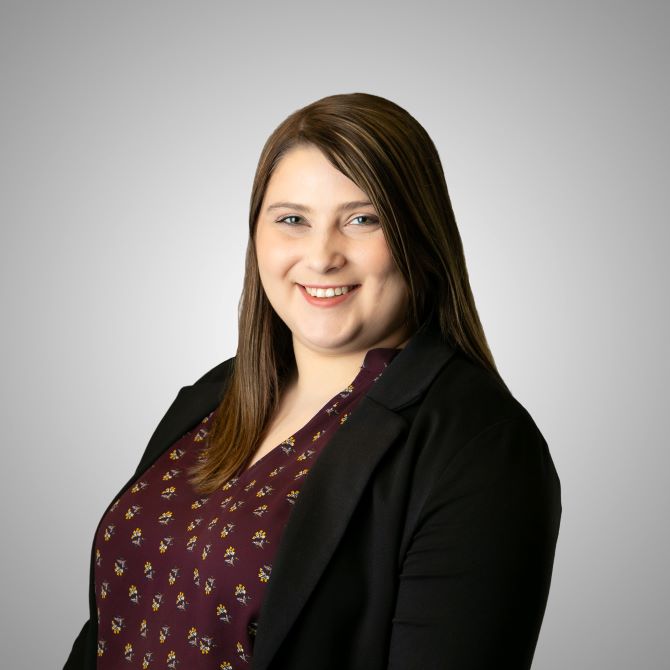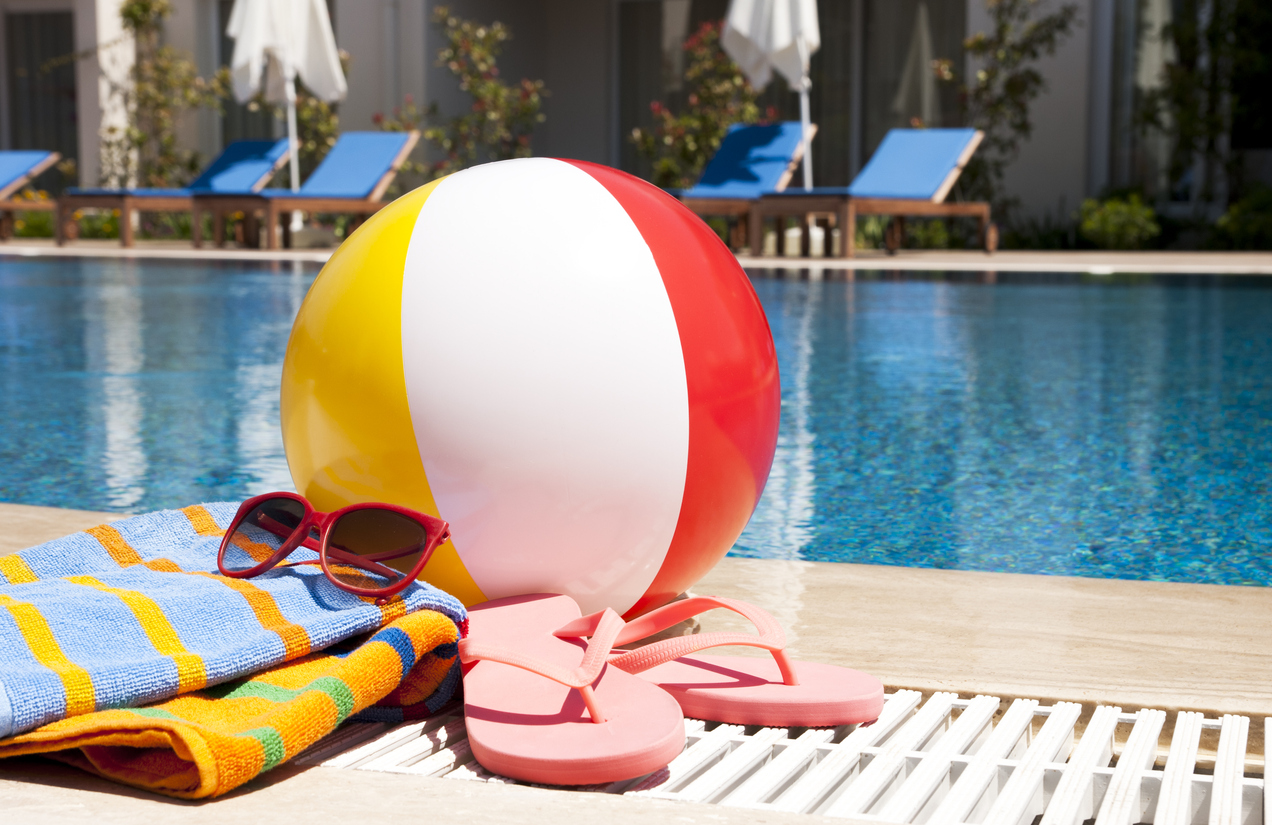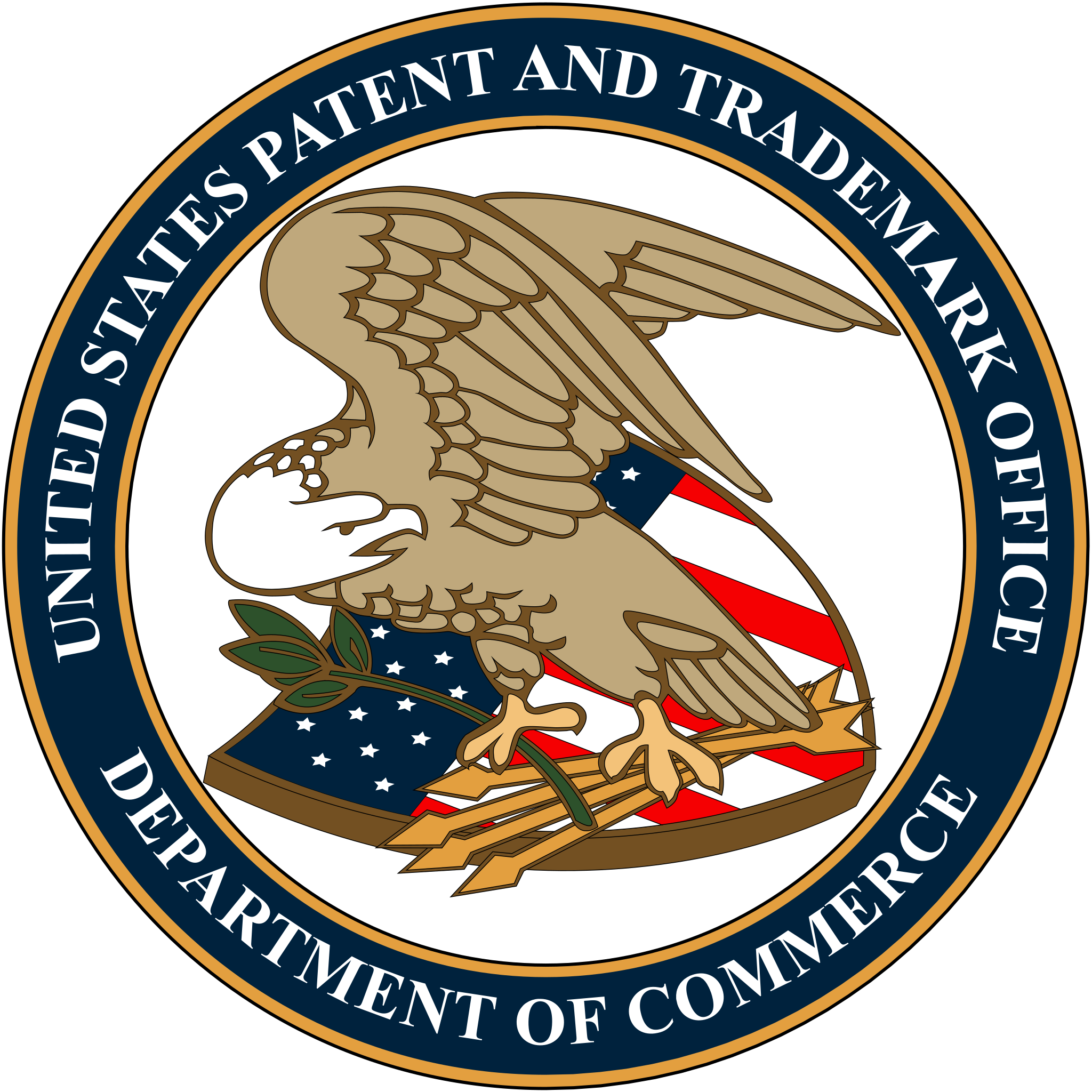Suiter Swantz IP Appoints Nicholas R. Grennan to Shareholder
Suiter Swantz IP proudly announces the addition of Patent Attorney, Nicholas R. Grennan, as a shareholder of the Firm.
Nick holds an engineering degree from Cornell University with a major in Operations Research & Information Engineering (described as “advanced analytics to help make better decisions”) and a J.D., cum laude, from Creighton University School of Law. Nick has prosecuted hundreds of patent applications across a diverse set of technologies. He enjoys advising clients on various issues throughout the life of patents, such as helping clients to enforce and monetize their patents, as well as defending clients from patent infringement lawsuits. Nick has a diverse practice that allows him to serve clients from conception of the invention through enforcement of an issued patent, and if necessary, in litigation.
Established thirty years ago, Suiter Swantz IP advises a diverse set of clients on patent, trademark, and copyright matters. Suiter Swantz IP has obtained over 6,000 U.S. patents and approximately 1,200 trademarks on behalf of the Firm’s clients, which include individual inventors, startups and Fortune 500 companies.
Suiter Swantz IP is a full-service intellectual property law firm providing client-centric patent, trademark, and copyright services. If you need assistance with an intellectual property matter and would like to speak with one of our attorneys, please contact us at info@suiter.com.
Suiter Swantz IP Appoints Troy P. Anderson, Ph.D. to Shareholder
Suiter Swantz IP proudly announces the addition of Patent Attorney, Troy P. Anderson, as a shareholder of the Firm, joining Sean P. Suiter, Chad W. Swantz, Matthew A. Poulsen, and Scot M. Ringenberg.
Troy holds a Ph.D. and M.S. in Optics from the College of Optics at the University of Central Florida, as well as a B.S. in Electrical Engineering from University of Nebraska Lincoln and a J.D. from University of Nebraska College of Law. He leverages this broad technical background to engage with inventors on complex technologies and to provide nuanced legal strategies. Troy is also actively involved with the startup community, providing both legal assistance and mentorship.
Established thirty years ago, Suiter Swantz IP advises a diverse set of clients on patent, trademark, and copyright matters. Suiter Swantz IP has obtained over 6,000 U.S. patents and approximately 1,200 trademarks on behalf of the Firm’s clients, which include individual inventors, startups and Fortune 500 companies.
Suiter Swantz IP is a full-service intellectual property law firm providing client-centric patent, trademark, and copyright services. If you need assistance with an intellectual property matter and would like to speak with one of our attorneys, please contact us at info@suiter.com.
Amazon Protects Patent Owners Through Utility Patent Neutral Evaluation Process
Chad Swantz is a patent attorney and co-owner of Suiter Swantz IP. Chad graduated with a Bachelor in Science in Electrical Engineering from the University of Nebraska-Lincoln, a Juris Doctor of Law from the University of Nebraska College of Law, and a Master of Business Administration from the University of Nebraska Omaha.
Courtney Cournoyer is a summer associate at Suiter Swantz IP. Courtney graduated from the University of Nebraska-Lincoln with a Bachelor in Science in Chemical and Biomolecular Engineering.
Amazon Protects Patent Owners Through Utility Patent Neutral Evaluation Process
Amazon has become the premier marketplace for online shopping. In particular, the ease that sellers are able to utilize Amazon’s marketplace to sell their own products sets Amazon apart from other online retailers. However, with this process being open to any seller that registers with Amazon, intellectual property concerns arise. In 2019, Amazon began its Patent Neutral Evaluation process as a way to strike a balance between patent holders enforcing their intellectual property rights and sellers facing accusations of infringing patents.
In essence, the Utility Patent Neutral Evaluation (UPNE) provides a relatively inexpensive method for US Utility patent holders to enforce their patents while also allowing a neutral process for accused sellers to provide a defense to an infringement allegation without resorting to federal patent litigation. The UPNE does not have a discovery process, oral arguments, nor an appeal process. Additionally, the UPNE will not provide damages, attorney’s fees, nor any other available remedies for the patent owner. The evaluation itself is a limited process, only considering one claim from an unexpired US Utility patent.
Patent owners may request to begin this process and submit up to 20 Amazon Standard Identification Numbers (ASINs) that they believe may be infringing on their patent. Amazon may reach out to the sellers of the accused ASINs may and give the sellers the option of having the ASINs accused of patent infringement removed from Amazon or to opt into the process. If a seller does not participate or respond within three weeks, Amazon will remove the accused ASINs.
If one or more sellers decide to participant in the process, a neutral evaluator will be selected by Amazon to assess the infringement claim. The neutral evaluator is likely to be an attorney experienced in patent disputes. Both the patent owner and seller must submit a $4,000 deposit to the evaluator within two weeks in order to continue the UPNE. Once payment is received by both parties, each side will have a chance to submit their arguments to the evaluator. The patent owner will likely be allowed 21 days to submit their initial arguments with the seller allowed 14 days to respond and the patent owner allowed another 7 days to reply back.
Within 14 days from the patent owner’s reply, the evaluator will announce whether they have found that the patent owner is likely to prove that the ASINs infringe. The prevailing party will have their $4,000 returned. If the patent owner is found to show they are likely to prove that the ASINs infringe on their patent, Amazon will remove the ASINs.
When compared to typical patent litigation, the UPNE offers a quick process, with expected completion expected in a couple months instead of one or more years which it typical for federal patent litigation. The deposit of $4,000 is also much more inexpensive when compared to litigation, which can cost hundreds of thousands of dollars to millions of dollars. Amazon’s UPNE process offers an accessible solution for patent owners to enforce their Intellectual Property rights quickly and efficiently, while also providing a fair manner for sellers to defend their products against allegations of patent infringement.
Suiter Swantz IP Welcomes Samantha Whittington to the Firm
Suiter Swantz IP Welcomes Samantha Whittington
Suiter Swantz IP is excited to welcome Samantha Whittington to the firm! Samantha joined the firm in September 2023 as the Marketing Assistant.
Samantha graduated from the University of Nebraska at Omaha with a Bachelor's in Business Administration and completed her Master's of Strategic Marketing at Bellevue University (2018.)
Before joining the firm, Samantha worked in various fields, including HVAC and finance. With marketing experience in small business and professional settings.
Samantha enjoys reading, video games, and spending time with her family outside the office. She is also learning how to hand embroider!

Suiter Swantz IP is a full-service intellectual property law firm providing client-centric patent, trademark, and copyright services. If you need assistance with an intellectual property matter and would like to speak with one of our attorneys, please contact us at info@suiter.com.
Back-to-School Essentials: A Closer Look at Game-Changing Patents
Back-to-School Essentials: A Closer Look at Game-Changing Patents
As another academic year approaches, students and educators anticipate new opportunities to learn. Join us as we explore back-to-school patents that have made education possible!
"Backpack"-U.S. Patent D641,973 S
A backpack is an essential back-to-school item. This specific design offers numerous pockets and compartments to neatly organize all your school supplies. With adjustable straps and cushioned back panels, it guarantees comfort, even when lugging around hefty books or a laptop.
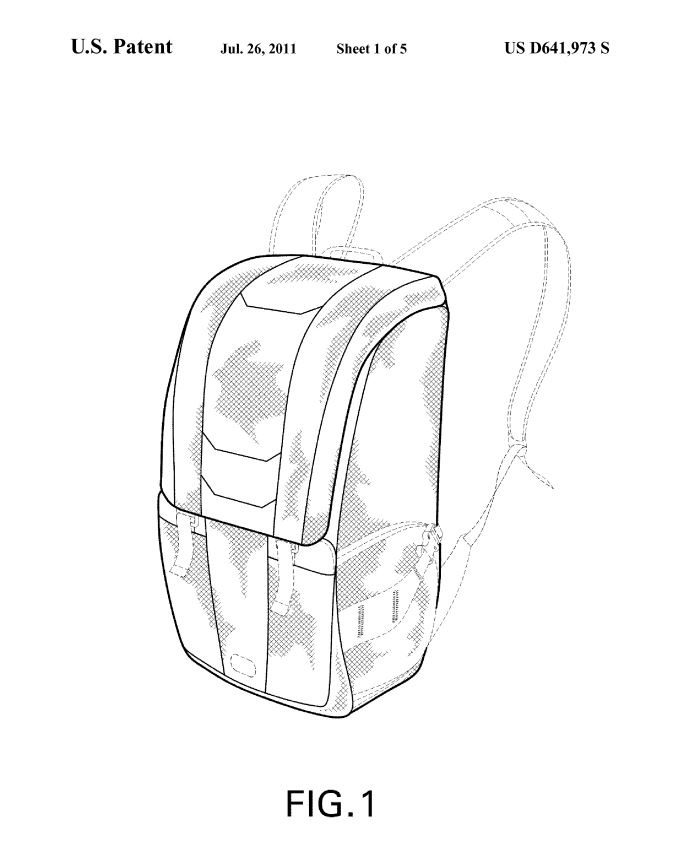
“Insulated Lunch Bag"-U.S. Patent #4,211,091
The lunch box is another school essential and has evolved into a modern-day lunch bag. The key distinction between the lunch box and the lunch bag lies in the bag’s more pliable material and increased storage space. Further, this 1980s vintage lunch bag offers insulation, keeping food and drinks cool throughout the school day.
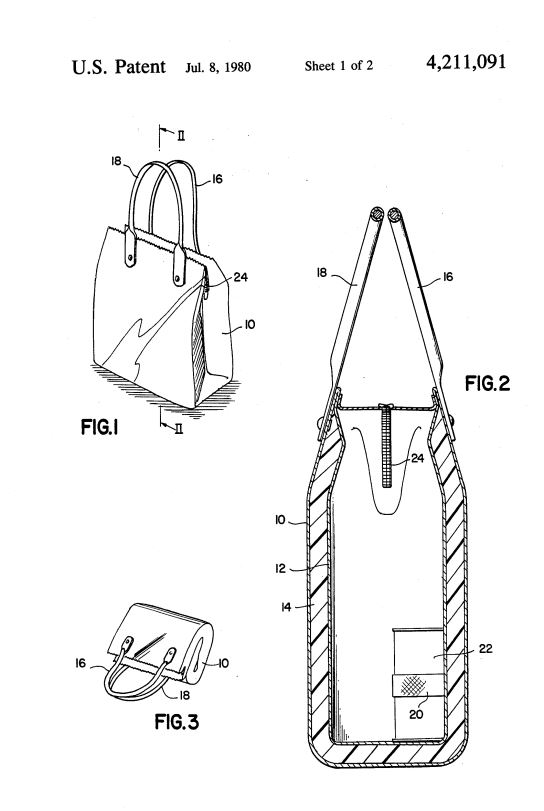
"Hand-Held Dry Erase Board System"-U.S. Patent #9,381,768 B2
Dry erase boards can be a great way to test the knowledge of individual students in the classroom. This patent, in particular, integrates the dry erase board, marker, and eraser into a single unit. Such a tool provides a personal canvas for learning and sharing in the classroom.
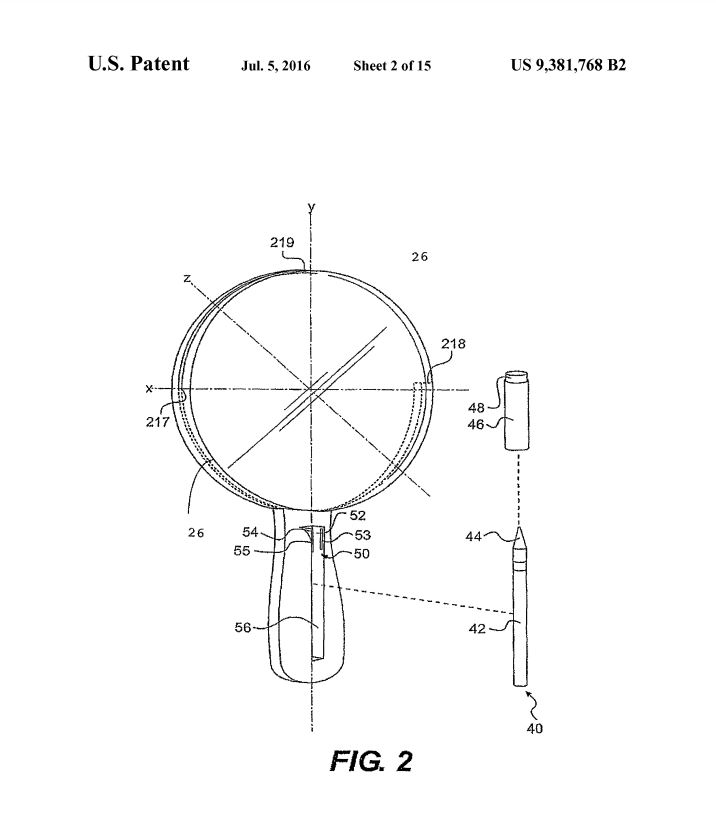
"Storage Locker"-U.S. Patent #3,819,246
Lockers play a crucial role in schools, serving as storage spaces for students' belongings. However, these particular storage lockers, commonly located in gym locker rooms, possess a unique design. They feature smaller compartments with visible perforations, enabling both transparency and ventilation, thus allowing any odors from gym class to dissipate.
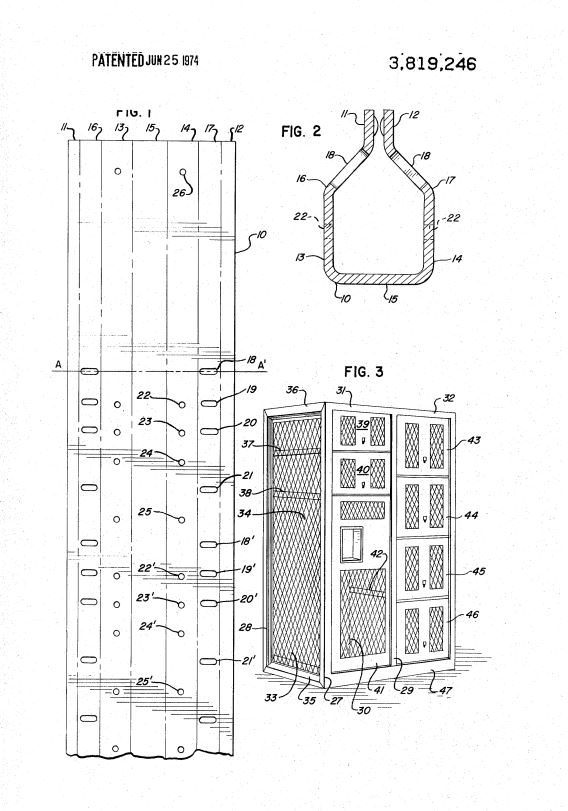
Suiter Swantz IP is a full-service intellectual property law firm providing client-centric patent, trademark, and copyright services. If you need assistance with an intellectual property matter and would like to speak with one of our attorneys, please contact us at info@suiter.com.
Fun in the Sun-Summer Patents!
Fun in the Sun-Summer Patents
What do you think of when you think of summer? Whether it’s a beach adventure or backyard fun, we have some summer inventions that you’re sure to love!
"Melon Slicing Device"-U.S. Patent #2,824,588
Watermelon is one of the most popular summer fruits around, and this device simplifies the cutting and serving process, allowing us to enjoy this delicious fruit without the extra work. Even more impressive is the versatility of this tool—it's not limited to just watermelons. It can easily handle other large fruits like cantaloupes or honeydew melons. The blades of Lyon’s invention perfectly slice any melon into eight sections, so you can spend more time soaking up the summer sun and less time in the kitchen.
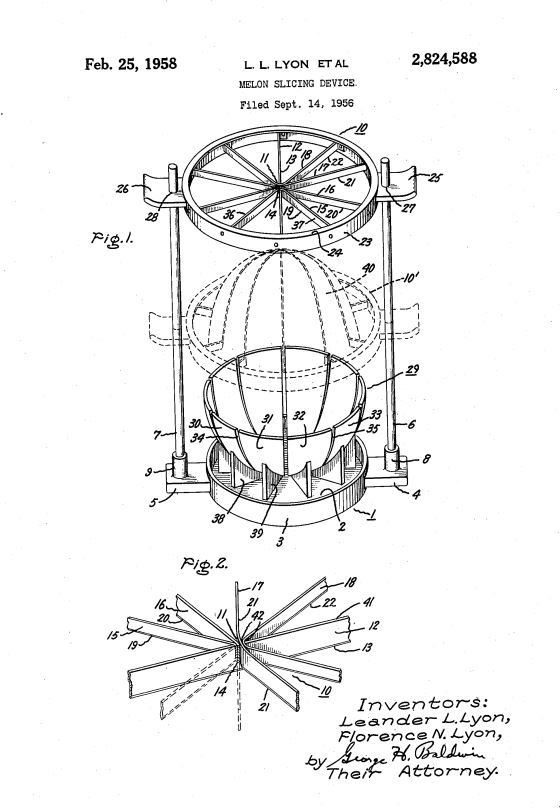
“Swim Goggles”-U.S. Patent #5,390,373A
Goggles are a summer essential for swimmers of all kinds, whether you are taking a dip in the pool or competing in competitive swim. They offer protection from harmful chlorine and provide clear underwater vision. The design of these swim goggles helps to reduce the strain on swimmers' eyes and allows easy tightening of the eye pieces.
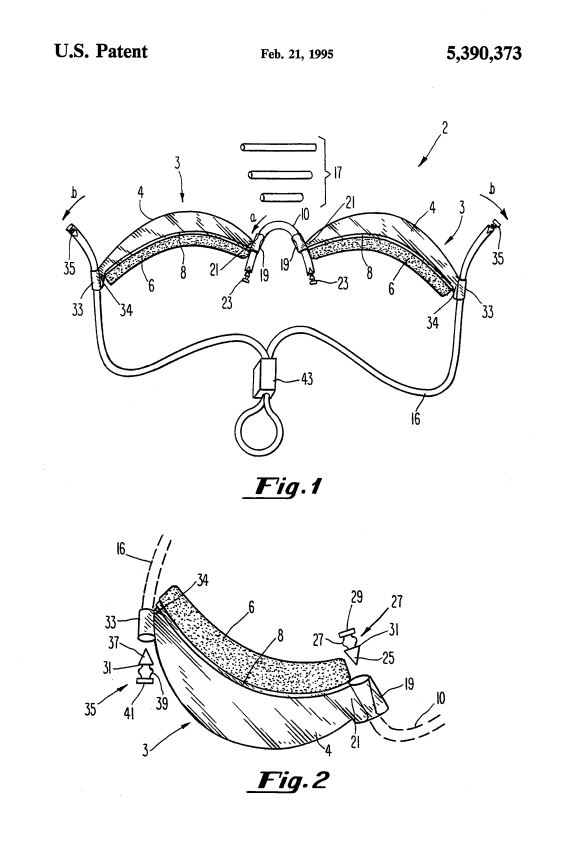
"Beach Towel"-U.S. Patent #5,406,659
The beach towel has become a necessity for summer activities, whether they're enjoyed by the ocean, a lake, or even a sunny backyard! This design includes a tool to anchor the towel in the sand, ensuring that it remains secure. Early beach towels were typically white and had a simple design. It wasn't until the mid-20th century that companies began producing beach towels with bright colors and designs. Overall, the beach towel is quite versatile as you can use it to dry off, suntan, or even have a picnic!
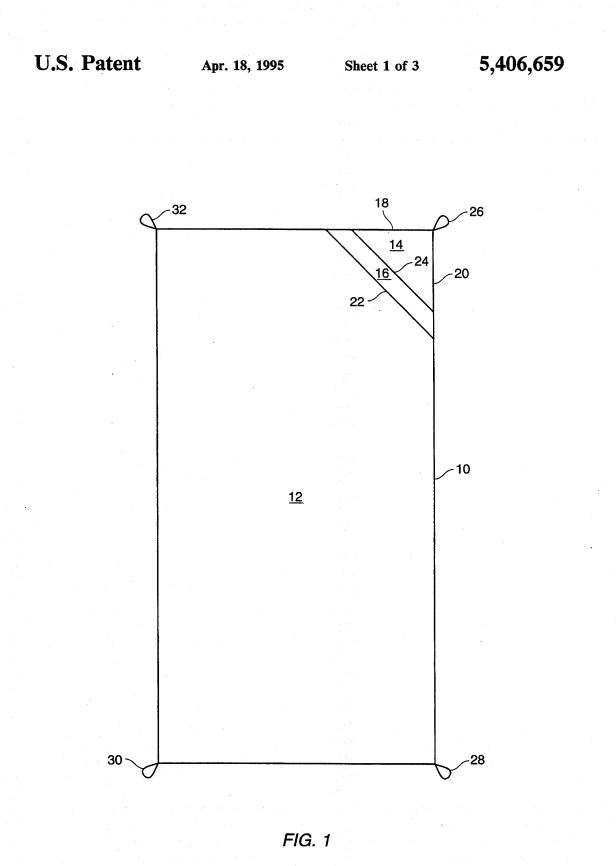
"Inflatable Stand Up Paddleboard"-U.S. Patent #8,591,274
Paddleboarding is a fun summer activity for people of all ages! This design provides a solution to the transportation challenges of more rigid boards. The inflatable paddleboard is best for lake outings and various summer events, since it can be easily inflated and deflated. So, even if you have a small car or no roof rack, you can still enjoy paddleboarding with ease.
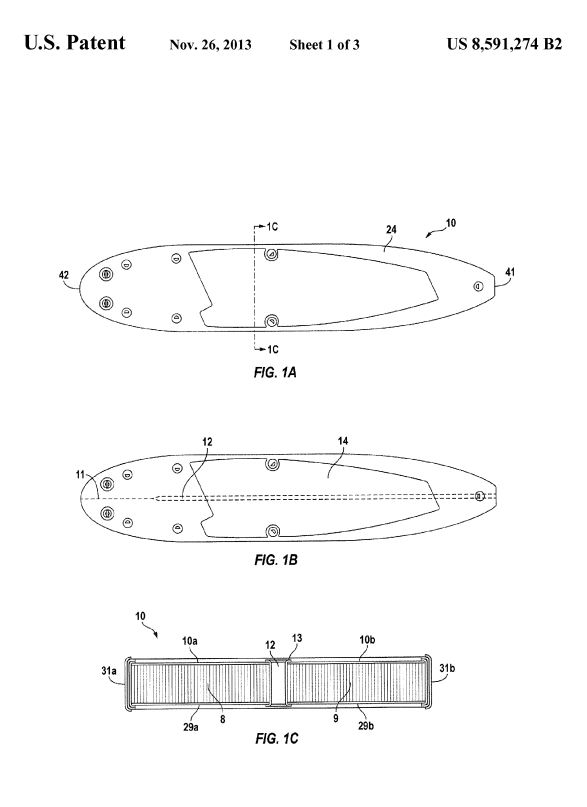
Suiter Swantz IP is a full-service intellectual property law firm providing client-centric patent, trademark, and copyright services. If you need assistance with an intellectual property matter and would like to speak with one of our attorneys, please contact us at info@suiter.com.
Out of the Park: How Intellectual Property Shapes the College World Series
Out of the Park: How Intellectual Property Shapes the College World Series
Following the NCAA’s Women’s College World Series in Oklahoma City, fans from around the country are gathering in Omaha, Nebraska for the NCAA’s Men’s College World Series.
The excitement of college softball has just reached its height with Oklahoma beating Florida State. The first WCWS took place in Omaha, Nebraska, back in 1982. Since then, this tournament featuring the nation's top eight teams has grown exponentially, becoming a greatly anticipated event in the college softball world.
This same anticipation is in the air in June when Omaha hosts the Men's College World Series (CWS). Since 1950, this iconic baseball event draws fans from all around the country, eager to watch the games and soak up the unique atmosphere of Omaha during the series.
As we approach the start of the CWS, our love for the game merges with our expertise in intellectual property. While you are cheering on your favorite teams this season, we encourage you to dive into the rich history of baseball patents and CWS trademarks.
Patents
"Ball Players Glove" U.S. Patent #550,949
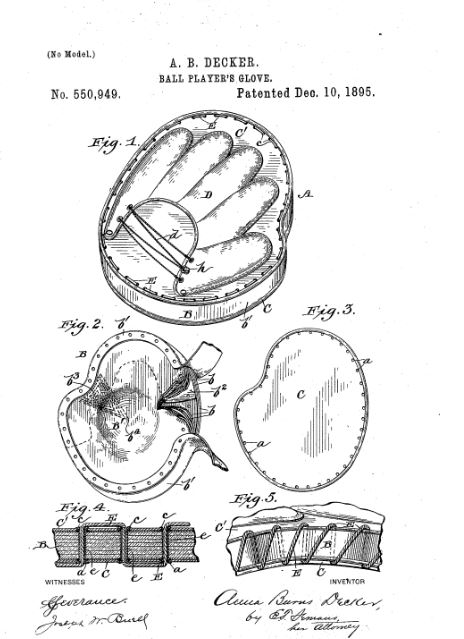
The journey of the baseball glove took a major leap on December 10, 1985, when Anna Burns Decker secured a patent for her innovative "Ball Player's Glove." Designed to provide a larger catching surface area and protect the hand from the ball's force, Decker's invention was a game changer in the sport's history.
With time, the evolution of the baseball glove continued, with manufacturers incorporating additional padding for hand and finger protection.
"Baseball Bat" U.S. Patent #1,499,128
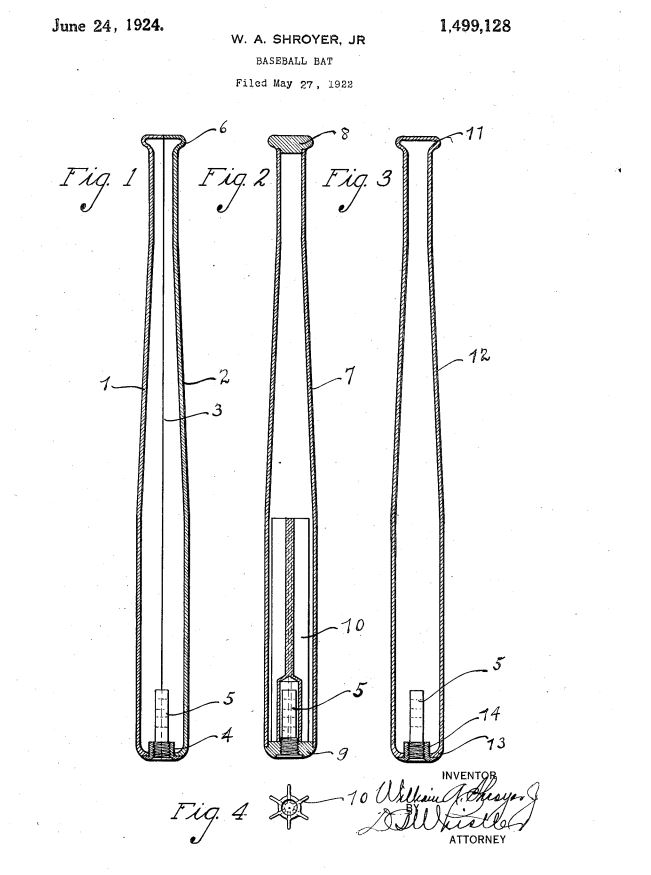
From the original hand-crafted wooden designs of William A. Shroyer’s time, bats have seen a transformation to metallic and composite materials. Yet, the popularity of wooden bats endures, with many players today preferring bats made from ash, maple, or birch.
In the early days of baseball, players made their own bats, which resulted in a wide variety of shapes and sizes. This changed in the 1850s when rules were put in place to standardize the bat's size.
"Baseball" U.S. Patent #1,668,969

Early versions of baseballs were often made from a range of materials, including pieces of old shoes or other leather, and were sometimes filled with rubber or cork. They were far less uniform than today's baseballs, which are subject to strict regulations about their size, weight, and composition.
Trademarks
You’ve likely heard these slogans during the month of June, but here is a little background on the origin of a few popular trademarks.
College World Series®
“College World Series” was registered in 1988 and “Women’s College World Series” was registered in 1991 by the Office of the Commissioner of Baseball. The National Collegiate Athletic Association (NCAA) is the exclusive licensee of the Marks.
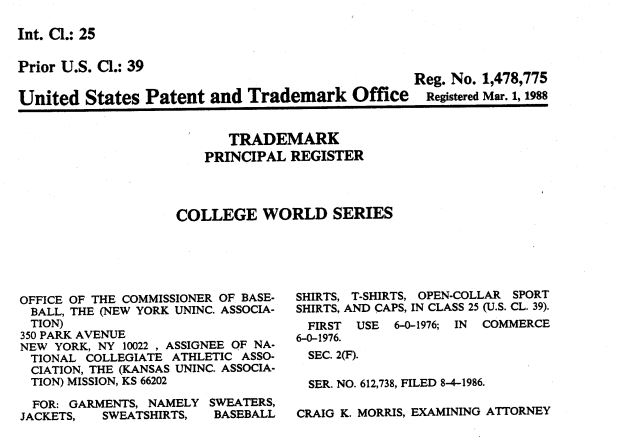
The Greatest Show on Dirt ®
“The Greatest Show on Dirt” was registered in 2008 by the NCAA. The slogan captures the excitement for the month of June for college baseball fans as they cheer on their favorite teams.
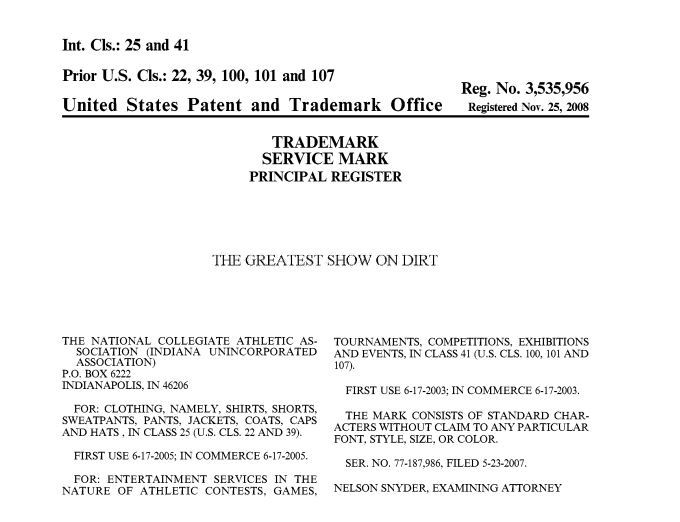
The Road to Omaha®
“The Road to Omaha” was registered in 2008 by the NCAA. The phrase describes the journey teams take to reach the CWS in Omaha.
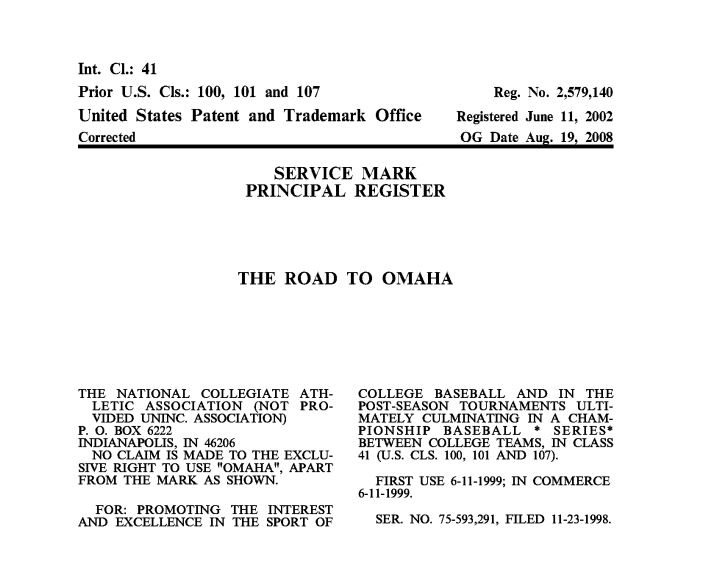
Suiter Swantz IP is a full-service intellectual property law firm providing client-centric patent, trademark, and copyright services. If you need assistance with an intellectual property matter and would like to speak with one of our attorneys, please contact us at info@suiter.com.
Suiter Swantz IP Welcomes Tom J. Simonson Back to the Firm
Tom Simonson Returns to Suiter Swantz IP
Suiter Swantz IP is excited to welcome back Summer Associate, Tom J. Simonson, to the firm! Tom will serve as a second-year summer associate.
Tom graduated with honors from the Colorado School of Mines with a Bachelor’s degree in Mechanical Engineering and a minor in Economics. Tom currently attends the University of Nebraska College of Law and expects to receive his Juris Doctor in May of 2024.
Outside of the office, Tom enjoys snowboarding, golfing, playing basketball, and watching Husker sports.
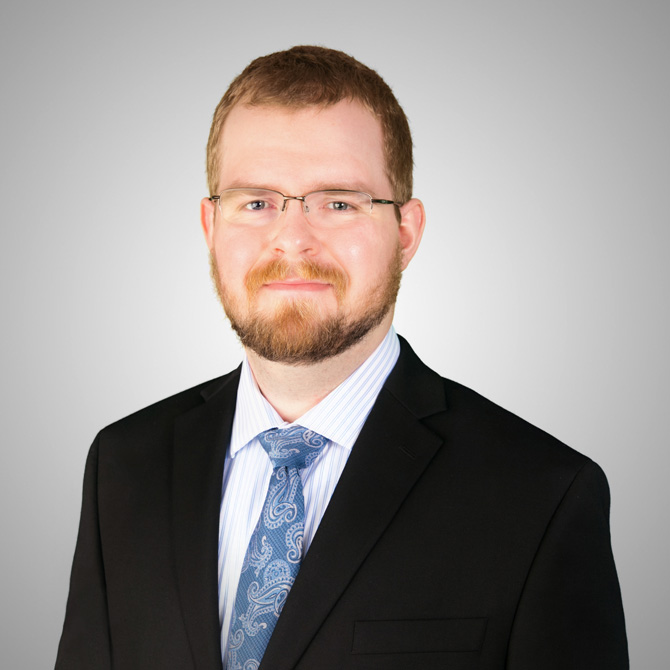
Suiter Swantz IP is a full-service intellectual property law firm providing client-centric patent, trademark, and copyright services. If you need assistance with an intellectual property matter and would like to speak with one of our attorneys, please contact us at info@suiter.com.
Suiter Swantz IP Welcomes Courtney M. Cournoyer to the Firm
Suiter Swantz IP Welcomes Courtney M. Cournoyer
Suiter Swantz IP is excited to welcome Summer Associate, Courtney M. Cournoyer, to the firm! Courtney will be joining the firm as a first-year summer associate.
Courtney graduated from the University of Nebraska-Lincoln with a Bachelor’s degree in Chemical and Biomolecular Engineering. Courtney currently attends the University of Nebraska College of Law and expects to receive her Juris Doctor in May 2025.
Prior to joining the firm, Courtney worked in a variety of fields including Agriculture Processes and Cosmetic Manufacturing. Outside of the office, Courtney enjoys video games, baking, and curling.
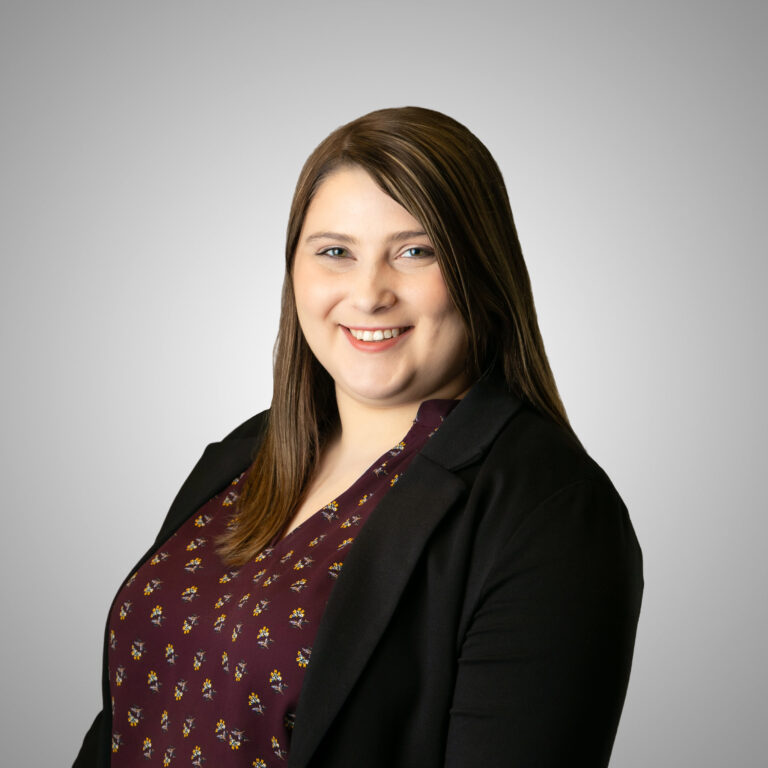
Suiter Swantz IP is a full-service intellectual property law firm providing client-centric patent, trademark, and copyright services. If you need assistance with an intellectual property matter and would like to speak with one of our attorneys, please contact us at info@suiter.com.
USPTO Update: Proposed Amendment for Design Patent Practitioner Bar
USPTO Update: Proposed Amendment for Design Patent Practitioner Bar
The U.S. Patent and Trademark Office (USPTO) has proposed an amendment to the rules of practice in patent cases and the representation of others before the USPTO.
The proposed amendment aims to establish a separate design patent practitioner bar, enabling specialized professionals to focus exclusively on design patent proceedings.
Currently, the USPTO operates with a single patent bar, which applies to individuals practicing in all patent matters before the USPTO. This includes utility, plant, and design patents. However, given the unique intricacies of design patent law and the increasing demand for specialized expertise, the USPTO recognizes the need for a designated bar for design patent practitioners.
The establishment of a design patent practitioner bar will not affect the ability of registered practitioners to continue practicing in any patent matters before the USPTO, including design patent cases. Those who are already registered will retain their privileges and maintain their status. The proposed amendment aims to create an additional avenue for practitioners, without hindering the rights of those already qualified.
By introducing a separate bar for design patent practitioners, the USPTO seeks to encourage broader participation. This move recognizes the distinct skills and knowledge required to effectively navigate the complexities of design patents.
Written comments on the proposed amendment must be received on or before August 14, 2023.
More information on the proposed amendment may be found at: Federal Register :: Changes to the Representation of Others in Design Patent Matters Before the United States Patent and Trademark Office
Suiter Swantz IP is a full-service intellectual property law firm providing client-centric patent, trademark, and copyright services. If you need assistance with an intellectual property matter and would like to speak with one of our attorneys, please contact us at info@suiter.com.
Matt Poulsen Co-Hosts Webinar with The Combine
Matt Poulsen Co-Hosts Webinar with The Combine

As a business or start-up, you need to be aware of the different types of Intellectual Property (IP) that exist and how they can benefit your company. In a recent webinar with The Combine, patent attorney Matt Poulsen provided insights into the benefits of obtaining IP with a focus on patents and trademarks best practices.
Suiter Swantz IP is proud to work with The Combine and Invest Nebraska as a supporting sponsor. The Combine is a statewide initiative supporting entrepreneurs in food and agriculture.
A recording of the webinar can be found here: https://youtu.be/OQBhwYu1IgQ
Suiter Swantz IP is a full-service intellectual property law firm providing client-centric patent, trademark, and copyright services. If you need assistance with an intellectual property matter and would like to speak with one of our attorneys, please contact us at info@suiter.com.
Suiter Swantz IP Patent Attorney, Shane Thielen, Taught Copyrights at Creighton University School of Law during the 2023 Spring Semester
Suiter Swantz IP Patent Attorney, Shane Thielen, Taught Copyrights at Creighton University School of Law during the 2023 Spring Semester

Shane’s course focuses primarily on the Copyright Act of 1976 and considers the types of works protected, the requirements for protection, and the scope of protection. The course also focuses on copyright issues created by recent and emerging technologies in the computer and electronic commerce areas.
This was Shane's third year of teaching Copyrights at Creighton University. When asked what his favorite part about teaching was, he said “telling young students jokes about old media technology.”
Shane received a B.S. in Computer and Systems Engineering from Rensselaer Polytechnic Institute. He then received a Juris Doctor, with honors, from Creighton University School of Law. Shane is also registered to practice before the United States Patent and Trademark Office and is also a member of the Patent Bar, and the Nebraska State Bar.




